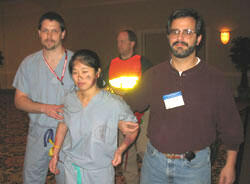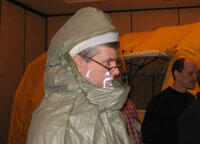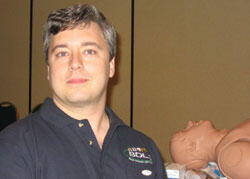March 18, 2004
VCU holds first bioterrorism training for the Commonwealth of Virginia
Share this story

Virginia Commonwealth University's new Virginia Disaster Readiness Center has begun offering a trio of newly designed bioterrorism courses for people in recognized first responder roles in public safety, public health and medical organizations from across the Commonwealth of Virginia.
VCU is providing high tech bioterrorism training to physicians, nurses, paramedics, police, firefighters, and select non-healthcare providers. Program organizers hope to train about three thousand people during the initial two-year roll out of the program, providing training among Central Virginia emergency and health staffers and accommodating personnel from other parts of Virginia as well.
The course work covers decontamination equipment, smallpox education, the strategic stockpile and patient and staff inoculations. The training courses employ lectures, small group training, facilitated group discussions and human patient simulator stations.
"Everyone has an important role to play in dealing with a bioterror event effectively," said Marsh Cuttino, M.D., assistant professor of emergency medicine in the VCU School of Medicine. "Every incident is different, but what is the same, is the expectation that the response is measured, predictable and efficient. Proper training insures people will execute their role and not step on another first responder or care giver."

The inaugural training session was held at the Marriott Hotel in downtown Richmond March 9-12. VCU is providing three courses Advanced Disaster Life Support or ADLS; Basic Disaster Life Support or BDLS; and Core Disaster Life Support or CDLS. The courses are based on new courses adopted by the American Medical Association and the National Association of EMS Physicians. 100 spaces are available in the BDLS course, 50 in the ADLS course.
BDLS is for healthcare providers, and first responders, emergency room doctors and nurses, paramedics, EMT's, firefighters and police. ADLS is intended for physicians and higher end health providers. CDLS is intended for non health care providers, government officials, hospital administrators and other individuals with an important role to play in a community disaster, especially one caused by a terrorist event.
VCU is using a two-year $3 million grant from the U.S. Department of Health and Human Services to provide the training. The award is one of 19 grants nationwide.
For information about registration for future sessions, contact the Office
of Continuing Medical Education, VCU School of Medicine, 1223 E. Marshall
Street, P.O. Box 980048, Richmond, VA 23298-0048, or call (800) 413-2872.
Additional information also is available on-line at www.vdrc.vcu.edu
and www.cme.vcu.edu.

Subscribe to VCU News
Subscribe to VCU News at newsletter.vcu.edu and receive a selection of stories, videos, photos, news clips and event listings in your inbox.










